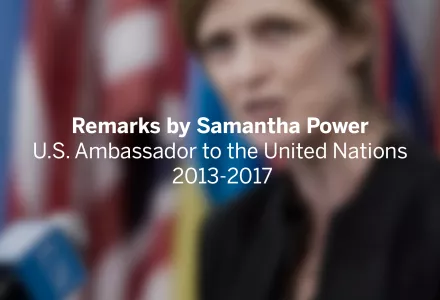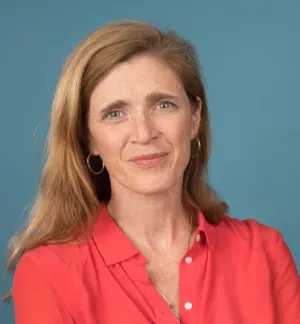
Thank you, Secretary-General Ban, for your briefing. Thank you also to Doctors Nabarro and Chan, for your remarks, and for the essential role that the United Nations is playing in confronting the Ebola epidemic. I’d also like to recognize all the people on the frontlines in this battle – people like Mr. Jackson Naimah – who are risking their lives to curb this deadly virus. Your dedication and your compassion humble us.
Today, the Security Council is holding an emergency meeting on a health crisis for the first time in the history of the United Nations. The Security Council has just issued a call to action. We have called on all nations to take swift and decisive action to contain the further spread of Ebola, and we have declared the current outbreak a threat to international peace and security.
As we heard unequivocally from today’s experts, the scale of this outbreak is unprecedented: by next week, more people will have died from Ebola in Liberia alone than in the 20 previous Ebola outbreaks combined. The director of the U.S.-based Centers for Disease Control and Prevention told UN representatives earlier this week, “I have never seen an infectious disease of this lethality spreading so fast.” Without a dramatic shift in the scale of our response, the number of infected individuals is projected to double every three weeks. Looking away will not make this go away.
One of the main reasons this outbreak has spread so dramatically is because – up to now – we haven’t come together sufficiently to confront it. Over the past ten months, as the deadly virus spread across Guinea, Liberia, and Sierra Leone, we relied on tactics that worked to contain past outbreaks. But West Africa had never been hit by Ebola before, so the affected countries had no prior knowledge or experience dealing with Ebola. The virus jumped across borders and penetrated urban areas, and local burial customs aided its spread. Picking up speed, it has overwhelmed clinics and hospitals, shuttered schools and businesses, and sowed fear in communities.
And precisely at the moment when a robust, united intervention was needed – some countries started to seal their borders. This reaction was understandable – driven by a mix of fear and a desire to protect one’s own citizens from the virus’s spread.
The problem is that, while isolation is effective and indeed necessary for dealing with individuals who may have been exposed to Ebola, it is utterly counterproductive when applied to entire countries. It deprives them of the very resources they need to bring the virus under control. So when governments in the region tell over 70 disease investigators that – if they travel to the affected areas to volunteer, they will not be not be allowed back into their own countries – they not only put the currently affected countries at greater risk, but also their own countries.
Today, instead of isolating the affected countries, we call for flooding them. Flooding them with the resources that are desperately needed to turn the tide in this fight.
On Tuesday, President Obama announced that the United States is going to establish a military command center in Liberia to support civilian efforts across the region, involving an estimated 3,000 U.S. forces. Supporting UN, regional, and national efforts, we are going to create an air bridge to get health workers and medical supplies into West Africa faster. We are going to build a new training site to prepare thousands of local health workers, so they can effectively and safely care for more patients. We are going to stand up additional treatment units, including new isolation spaces and more than 1,000 beds. And we are going to work with partners to distribute supplies and information kits to hundreds of thousands of families, so they can better protect themselves.
Today, several other governments – hopefully many other governments – will announce commitments, joining a growing cadre of countries that have already stepped up – like the troop and police contributing countries who serve commendably in the UN peacekeeping mission in Liberia. And we welcome the Secretary-General’s announcement of a new mission – UNMEER – that will lead a historic effort to mobilize commitments and direct them where they are most needed.
This challenge far surpasses the abilities of any one nation, or even any region to tackle alone. This must be an all-hands-on-deck operation. The private sector, foundations, and NGOs also have a crucial role to play. And some, like MSF and the Gates Foundation, are already leading the charge.
One MSF staff member, Pierre Trbovic, was deployed last month to Monrovia, to the biggest Ebola treatment center ever built. But by the time he arrived, it was completely full, just like the clinics Jackson Naimah described today. Pierre had the devastating job of telling patients and their relatives that MSF couldn’t take them in.
Pierre wrote: the first person I had to turn away was a father who had brought his sick daughter in the trunk of his car. He was an educated man, and he pleaded with me to take his teenage daughter, saying that while he knew we couldn’t save her life, at least we could save the rest of his family from her. Other families just pulled up in cars, let the sick person out and then drove off, abandoning them. One mother tried to leave her baby on a chair, hoping that if she did, we would have no choice but to care for the child.
That scene is playing itself out right now in clinics across the region.
We don’t want to live in a world where a father, bearing his sick daughter, is turned away from treatment. It’s against everything that we believe in and stand for. It’s wrong. And it’s dangerous, because people we turn away are all but certain – as we heard – to infect others.
Today’s resolution is important. It’s a call to action, not just from the Security Council, but from the entire UN family. Today’s resolution has 130* co-sponsors – the most co-sponsors ever for any Security Council resolution in the history of the United Nations. That means that 2,176 resolutions came before this one, and had fewer co-sponsors. This is a degree of unanimity and unity that we rarely see. But if today’s resolution is not followed by action on a scale and scope commensurate to the virus, this resolution will be cited years from now as evidence that we raised hopes that we didn’t deliver on. Knowing what we know now about the exponential spread of this deadly virus, we will have no excuse if we still fail to come together to do what is needed – if we do not dig deep. Nobody will be able to say we didn’t realize it could get so bad.
This problem is solvable. We know how to give people infected with Ebola a fighting chance, and how to care for them with dignity. We know how to prevent new outbreaks, and how to prepare countries to find and stop them when cases occur. And while our response will take time to ramp up, and the epidemic will get worse before it gets better, our actions can save countless lives. The math is simple: the sooner we act, the more lives we save.
So to every country represented here, especially those still figuring out how they will respond, take this message back to your capitals, please. The math is simple: the sooner we act, the more of us that contribute, the more lives we save. We can bend the curve. We must bend the curve.
For those who are skeptical, just look at Nigeria. Two outbreaks were detected there during the epidemic. One was in Lagos, which has a population of over 21 million. In just a few weeks, over 1,000 professionals were mobilized and conducted more than 18,000 home visits. They tracked down 20 cases of infected people, as well as 890 people that those infected individuals had come into contact with. As a result of this swift, methodical effort, so far Nigeria’s outbreaks seem to have been contained.
Look also to Ghanaian President John Dramani Mahama, who visited Guinea, Liberia, and Sierra Leone this week, and warned that panicking and isolating affected countries will only make the outbreak worse. And the United State also wants to express its gratitude to Senegal for allowing its main airport to serve as a regional hub for emergency personnel and supplies.
We have all been alarmed by the models of the Ebola’s trajectory that we have seen – models in which infections rise in steep, terrifying curves. We have seen these kinds of things in Hollywood movies, but not in real life in recent history. These models show what could happen if we continue to let fear, inaction, or indifference drive our response. We have to find resources that right now many think they can’t afford to spare.
Every country in this room today can contribute something that will save a life: doctors, nurses, hospital beds. We heard: food, soap, buckets.
Models are forecasts of the future. But it is what we do – and by we, I mean all of the countries that we here represent and those beyond. It is we that actually determine our future. Individuals make history, not models.
The United Nations was built for global challenges like this. That is why we are here. Let us rise together to confront this challenge head-on. Thank you.
*Note: Additional co-sponsors were added after Ambassador Power spoke. The final number of co-sponsors was 134.
###
Power, Samantha. “Remarks by Ambassador Samantha Power at an Emergency Security Council Meeting on Ebola.” September 18, 2014


